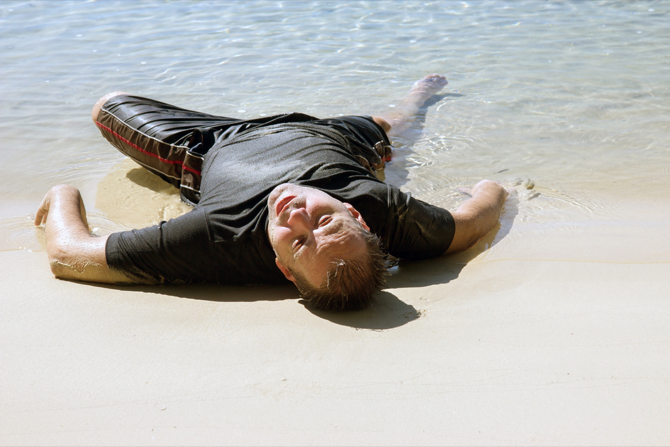If you read financial news or blogs, you probably hear about people "drowning in debt" all the time. You may have even said it yourself. It's become cliché to describe your debt situation as "drowning." But I'm here to tell you to stop. Don't say it anymore.
It's Not Hopeless
First of all, let's talk about what people mean when they say they're drowning in debt. Usually what they mean is that they have more debt than they know what to do with. It's probably causing a lot of stress. It might be derailing other life plans. And it very well may feel hopeless.
It feels like an entire ocean of debt is surrounding you -- but it's important to remember that you're not in an infinite sea of red ink. It might be far away, but there is an end to your debt. To remind yourself of that, start making a habit of visualizing your debt to see where you are, where you've made progress, and where you're going.
You might, for example, keep a spreadsheet with all of your payments and total debts. It seems like a masochistic exercise, but when you start to make progress, you'll see it, and the feeling of hopelessness will lift. A visual reminder of your debt can also be very motivating when it comes to paying it off. It's not going to be pretty at first. But it will remind you that you have an achievable goal.
Take Back Control
If you picture someone who's drowning, are you seeing someone who's in control? Probably not. Losing control is likely what got you into debt in the first place. Maybe you're addicted to shopping online. Or you tend to buy too much to fit in with your friends. Or maybe you just like to buy clothes. Whatever the reason, there's a good chance that a loss of control put you in your current predicament.
So take back control. It might be by starting to carefully budget out all of your spending. Or putting a little bit in savings each month. Or establishing an emergency fund. Whatever you need to do to feel like you're starting to take control, do it. Even journaling about your financial worries and goals can be a great first step in regaining your sense of self-control in the face of debt.
Don't think of your debt as a sea that you're drowning in. Instead, think of it as a hill you're climbing up. That way, if you have a setback, you just have to keep climbing instead, of . . . well, dying. Build up some momentum with a 30-day money challenge or set a specific financial goal for yourself. When you're actively trying to tackle your debt, instead of being a passenger along for the ride, the entire process is much less intimidating.
Be Patient
When you're drowning, there's a very specific point at which you're safe from danger: when you're out of the water. Maybe you wash up on the beach, or someone pulls you up into a boat. No matter what happens, you're safe. Getting out of debt isn't like that at all.
Getting out of debt is a long, slow process that requires consistent effort and good habits. There's a point at which you're debt-free, but it doesn't come quickly. It may take many years, in fact. But progress builds on itself, and methodical action over time will help you continue making progress. Remember to focus on the long game.
To get your financial footing, you'll need to commit to making good financial decisions, and that means you'll need to understand the basics of financial health. Preparation, planning, and follow-through may not save you from drowning, but they'll certainly get you out of debt. Once you've established this foundation, you can really start moving toward being debt-free.
Don't Be Consumed by Debt
If you're drowning, you better be concentrating on extricating yourself from that situation. Getting out of debt, on the other hand, doesn't need to be the sole focus of your life. In fact, if it has been your sole focus, that's probably why you feel like you're drowning in the first place.
Balance is a crucial part of a healthy lifestyle. If all of your mental energy is going to a single thing, you're going to be neglecting other parts of your life. And once you get to that point, you're in trouble. To keep your debt from taking over your life, make sure to take time to reflect on where your mental energy is going (journaling is a great way to do this).
If you start to feel like your debt is taking over your life, it's time to take action. Spend more time doing things you love. Read more books. Pick up a side gig. Learn a new skill. Set aside time for your family and friends. Just make sure that you have other things to think about to counter the stress you experience from debt. Remember what Thomas Merton said: "Happiness is not a matter of intensity but of balance, order, rhythm and harmony."
Stop Drowning, Start Climbing
Whether or not you've ever described yourself as "drowning in debt," I hope these tips have helped you see how important it is to think about your debt in a useful way instead of one that makes it feel worse. Keep a productive mindset, and you'll keep moving forward.
How do you think about your debt? Do you ever feel like you're drowning, or do you make a point to think more positively? Share your thoughts in the comments below!
Image Credits: alphaspirit/Shutterstock




